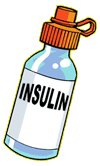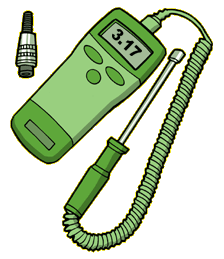
|
What is diabetes, anyway? What happens to your body if you have diabetes? I've heard of different names for diabetes - my grandma calls it "sugar," and my friend has juvenile diabetes. Are these the same thing? How would I know if I have diabetes? Why do I hear so much about diabetes now? Do more people have it? Is there a cure for diabetes? |
|
| What is diabetes, anyway? | |
 Your body makes a hormone called insulin that helps break down the food you eat every day. Every time you eat something, your body turns that food into glucose, which is what you use for energy. If a person has diabetes, his or her body either has trouble producing enough insulin to do this, or it's not able to use the insulin it makes. Either way, their cells can't use the energy from the food they eat, and they build up too much sugar in their blood and urine. Your body makes a hormone called insulin that helps break down the food you eat every day. Every time you eat something, your body turns that food into glucose, which is what you use for energy. If a person has diabetes, his or her body either has trouble producing enough insulin to do this, or it's not able to use the insulin it makes. Either way, their cells can't use the energy from the food they eat, and they build up too much sugar in their blood and urine. |
|
| What happens to your body if you have diabetes? | |
|
Having too much sugar in your blood can damage every part of your body, especially your eyes, kidneys, nerves, heart, and even gums! Over a lifetime, having diabetes puts someone at much greater risk of heart attack, stroke, blindness, and kidney failure. Circulation problems and nerve damage can also mean that people with diabetes have to have their feet or legs amputated. Fortunately, diabetes can be prevented in many cases. And, taking good care of yourself if you have diabetes can prevent a lot of these scary things from happening. |
|
| I've heard of different names for diabetes - my grandma calls it "sugar," and my friend has juvenile diabetes. Are these the same thing? | |
|
There are two types of diabetes. While both have similar effects - your body can't process glucose right - different things cause them. Juvenile diabetes got its name because most people who got this type of the disease got it when they were children (even though adults can get it, too). Now, it is called type 1 diabetes. This kind of diabetes happens when the immune system attacks the cells that make insulin in a body organ called the pancreas. Without insulin, you develop diabetes. Between 5 and 10 percent of people with diabetes have this kind. The other kind of diabetes is called - you guessed it - type 2 diabetes. With this kind, your body makes insulin, but it either doesn't make enough, or something prevents your body from using it right.  Until recently, most cases of type 2 diabetes were in older people and adults who were overweight. In the last few years, though, more and more kids are being diagnosed with this kind of diabetes. Most likely, this is because kids today are more likely to be overweight and not get enough exercise than they were in the past. Children who are African-American, Hispanic, Asian, or Native American are more likely to develop type 2 diabetes than others. Until recently, most cases of type 2 diabetes were in older people and adults who were overweight. In the last few years, though, more and more kids are being diagnosed with this kind of diabetes. Most likely, this is because kids today are more likely to be overweight and not get enough exercise than they were in the past. Children who are African-American, Hispanic, Asian, or Native American are more likely to develop type 2 diabetes than others.Because diabetes causes people to have too much glucose, or sugar, in their blood, a lot of people call it sugar or sugar diabetes. No matter the name, though, it's all the same disease. Scientists do not know exactly how many kids have diabetes, but they do know that doctors are seeing more and more cases of diabetes in kids. And most of these cases are now type 2 diabetes, which used to be very rare among kids. |
|
| How would I know if I have diabetes? | |
|
Signs of type 1 diabetes are usually hard to miss. They include being unusually thirsty or hungry, having to pee a lot, and being really tired. Rapidly losing weight and having blurry vision are also symptoms of type 1 diabetes. These often happen really quickly - in just a few weeks. If you notice these symptoms, tell your parents right away so that a doctor can check you out. Many people with type 2 diabetes don't have any signs, especially in the early stages. Over time, someone with type 2 diabetes might see some of the same signs as type 1. |
|
| Why do I hear so much about diabetes now? Do more people have it? | |
|
A lot more people have diabetes now - over 18 million Americans. That's more than twice as many people as 20 years ago. While most people with diabetes are over 50 years old, rates of diabetes in kids have been going up really quickly -- about a percent a year. So, even though it's still pretty rare for a kid to have it, more kids than ever before are living with this disease. |
|
| Is there a cure for diabetes? | |
|
There is no cure for diabetes, but it can be controlled with medicine, exercise, and eating right. These three things work together to keep blood sugar under control. There are a lot of different medicines to treat diabetes. One type you might have heard of is insulin shots, which probably sound scary - who wants to get a shot every day? But for people with type 1 diabetes, taking insulin every day is a lifesaver. And, many kids will tell you that it's not such a big deal once you get used to it. Also, today many kids who need insulin get it through a pump that ataches to their bodies. They wear it on their waist, and it looks like a pager or cell phone. For kids with type 2 diabetes, doctors will first help them try to lose some weight, increase their exercise, and eat a better diet. This often works to control their diabetes. Some kids with type 2 diabetes have to take a pill or insulin every day, too. For any person with diabetes, eating right and getting exercise are very important in keeping it under control. And, keeping weight within a healthy range is also really good for someone with diabetes, because being overweight can make controlling blood sugar more difficult. |
